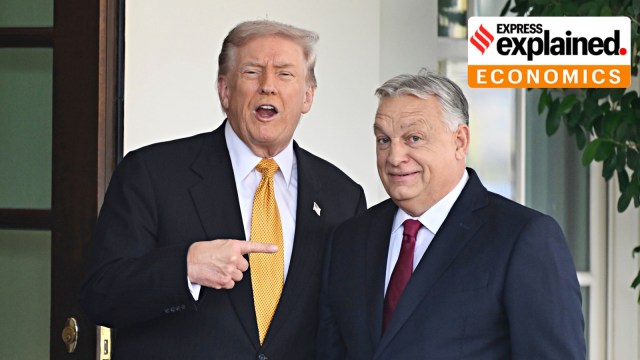Just weeks after announcing sanctions on Russian oil companies Rosneft and Lukoil on October 22, the US on Friday (November 7) surprisingly announced a one-year exemption for Hungary after the European country committed to purchasing US liquefied natural gas (LNG) worth approximately $600 million and nuclear fuel worth $114 million.
Notably, following his high-stakes talks with Chinese President Xi Jinping on October 30, US President Donald Trump had said that the issue of Russian oil did not come up for discussion, even though China is the largest purchaser of Russian oil. The country has also successfully set up a domestic payment mechanism, future-proofing itself against sanctions.

In sharp contrast, India is not only witnessing a steep decline in exports to the US due to high tariffs but has also begun seeing a drop in cheaper Russian oil supplies — a trend that could potentially strain long-standing ties with Moscow. While low commodity prices are giving the US room to wield sanctions at its discretion, New Delhi seems to be paying the steepest price for purchasing Russian oil, unlike others.
Story continues below this ad
This comes amid differences between the two countries over a trade deal. The US imposed steep 50 per cent tariffs on India on August 27 after a trade deal could not be reached due to several concerns, including India’s objection to genetically modified US agricultural products. India’s exports to the US slipped 12 per cent in September, particularly hurting labour-intensive exports.
Exemption to Hungary is more political than economic
Trump, at a press conference with Hungary’s Prime Minister Viktor Orbán, said that European leaders should respect Orbán because “he’s been right on immigration” and that “Orbán understands Putin and knows him very well and feels we’re going to get that war ended in the not-too-distant future.”
This is something that has previously been noted with Trump, who has favoured or punished countries partly based on his view of their leaders’ policies. South Africa, Argentina and Brazil are a few other examples.
Justifying the exemption, Trump said Hungary faced unique logistical challenges, including access to a sea that could be used to drill oil. However, the Centre for the Study of Democracy (CSD), a European public policy institute, said in a report that phasing out Russian oil is fully feasible for Hungary and Slovakia, as the Adria pipeline from Croatia supplying non-Russian crude can meet their combined needs. The CSD report noted that Hungary and Slovakia have shown no real signs of decoupling from Russian crude.
Story continues below this ad
“Hungary increased its Russian crude reliance from 61 per cent pre-invasion to 86 per cent in 2024, and Slovakia remained almost 100 per cent dependent on supply from Moscow,” the report said. The Trump administration had targeted India, particularly arguing that New Delhi ramped up imports of Russian oil after the war.
“Despite the EU’s push to reduce dependency on Russian gas, Hungary and Slovakia have significantly ramped up their imports via the TurkStream pipeline — transforming Hungary into a strategic Kremlin-backed gas hub for Central and Southeast Europe that undermines EU diversification efforts and reinforces opaque, politically captured networks that entrench Russian influence,” CSD said.
India’s imports of Russian oil slip
Following the sanctions announcement, which is expected to come into effect on November 21, Russian oil dispatches to India have dropped sharply. In the week to October 27, crude oil exports to India from Russia averaged 1.19 million barrels per day (bpd), significantly down from 1.95 million bpd in the previous two weeks, according to provisional vessel tracking data from global commodity data and analytics provider Kpler.
As expected, the crash in exports is driven by lower dispatches from Rosneft and Lukoil, which account for over half of Russia’s oil production and exports, and are used to make up more than two-thirds of India’s Russian oil imports. Exports to India from Rosneft — Russia’s largest oil company — plunged to 0.81 million bpd in the week to October 27 from 1.41 million bpd in the previous week. For Lukoil, no dispatches to India were recorded in the week to October 27, as against 0.24 million bpd in the previous week, The Indian Express had reported.
Way out of India in a US deal
Story continues below this ad
A trade deal with the US involving higher purchases of American energy could be a way out for India. This could also help New Delhi secure a more favourable tariff rate of between 15 and 20 per cent. However, the ongoing US Supreme Court case on the legality of the tariffs could impact the dynamics if the Trump administration loses.
Commerce Minister Piyush Goyal in September had said that India is a large importer of energy and that its energy security goals will have a “very high element” of US involvement in the years to come. Expressing interest in small modular reactor (SMR) innovations in the US, Goyal said that both countries will also continue to work together in the nuclear energy sector going forward.
Both SMR and oil purchases feature in the US deal with Hungary, too. Hungary and the United States signed a Memorandum of Understanding on Nuclear Energy stating that both parties intend to start negotiations to facilitate cooperation across the civil nuclear industry, including Small Modular Reactors (SMRs) and spent fuel storage.
“The United States and Hungary are collaborating to make Budapest a hub of the emerging Central European SMR market, deploying market-leading US nuclear innovation to jumpstart a new transatlantic industry. Hungary signalled it intends to support the construction of up to 10 SMRs with a potential value of up to $20 billion,” the joint statement said.








































